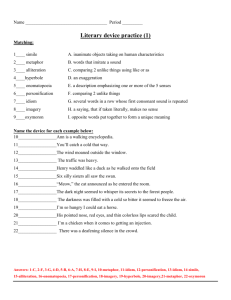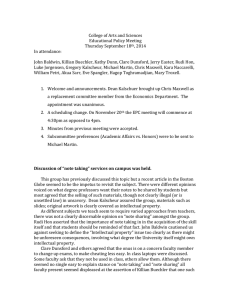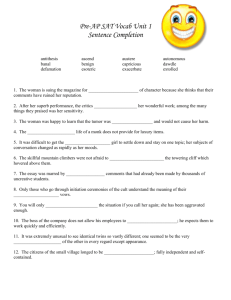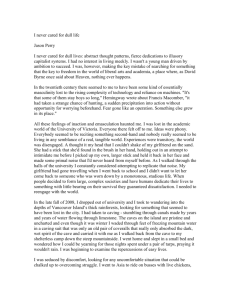T-extension and null subject licensing Ivona Kuˇcerov´a, UCL
advertisement
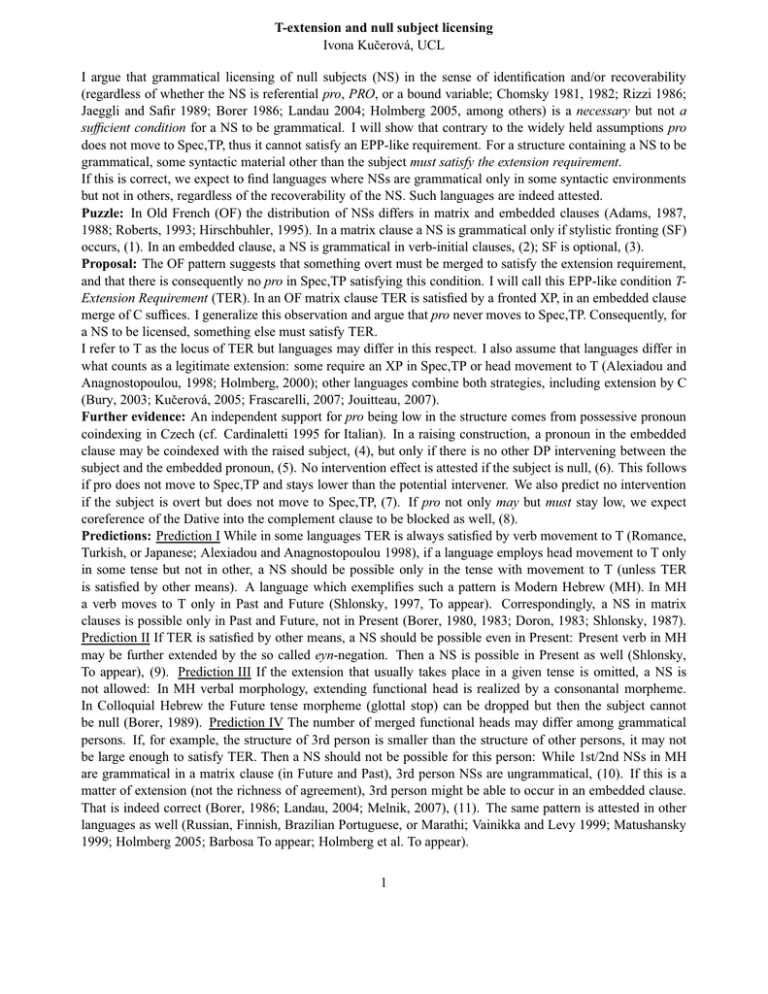
T-extension and null subject licensing Ivona Kučerová, UCL I argue that grammatical licensing of null subjects (NS) in the sense of identification and/or recoverability (regardless of whether the NS is referential pro, PRO, or a bound variable; Chomsky 1981, 1982; Rizzi 1986; Jaeggli and Safir 1989; Borer 1986; Landau 2004; Holmberg 2005, among others) is a necessary but not a sufficient condition for a NS to be grammatical. I will show that contrary to the widely held assumptions pro does not move to Spec,TP, thus it cannot satisfy an EPP-like requirement. For a structure containing a NS to be grammatical, some syntactic material other than the subject must satisfy the extension requirement. If this is correct, we expect to find languages where NSs are grammatical only in some syntactic environments but not in others, regardless of the recoverability of the NS. Such languages are indeed attested. Puzzle: In Old French (OF) the distribution of NSs differs in matrix and embedded clauses (Adams, 1987, 1988; Roberts, 1993; Hirschbuhler, 1995). In a matrix clause a NS is grammatical only if stylistic fronting (SF) occurs, (1). In an embedded clause, a NS is grammatical in verb-initial clauses, (2); SF is optional, (3). Proposal: The OF pattern suggests that something overt must be merged to satisfy the extension requirement, and that there is consequently no pro in Spec,TP satisfying this condition. I will call this EPP-like condition TExtension Requirement (TER). In an OF matrix clause TER is satisfied by a fronted XP, in an embedded clause merge of C suffices. I generalize this observation and argue that pro never moves to Spec,TP. Consequently, for a NS to be licensed, something else must satisfy TER. I refer to T as the locus of TER but languages may differ in this respect. I also assume that languages differ in what counts as a legitimate extension: some require an XP in Spec,TP or head movement to T (Alexiadou and Anagnostopoulou, 1998; Holmberg, 2000); other languages combine both strategies, including extension by C (Bury, 2003; Kučerová, 2005; Frascarelli, 2007; Jouitteau, 2007). Further evidence: An independent support for pro being low in the structure comes from possessive pronoun coindexing in Czech (cf. Cardinaletti 1995 for Italian). In a raising construction, a pronoun in the embedded clause may be coindexed with the raised subject, (4), but only if there is no other DP intervening between the subject and the embedded pronoun, (5). No intervention effect is attested if the subject is null, (6). This follows if pro does not move to Spec,TP and stays lower than the potential intervener. We also predict no intervention if the subject is overt but does not move to Spec,TP, (7). If pro not only may but must stay low, we expect coreference of the Dative into the complement clause to be blocked as well, (8). Predictions: Prediction I While in some languages TER is always satisfied by verb movement to T (Romance, Turkish, or Japanese; Alexiadou and Anagnostopoulou 1998), if a language employs head movement to T only in some tense but not in other, a NS should be possible only in the tense with movement to T (unless TER is satisfied by other means). A language which exemplifies such a pattern is Modern Hebrew (MH). In MH a verb moves to T only in Past and Future (Shlonsky, 1997, To appear). Correspondingly, a NS in matrix clauses is possible only in Past and Future, not in Present (Borer, 1980, 1983; Doron, 1983; Shlonsky, 1987). Prediction II If TER is satisfied by other means, a NS should be possible even in Present: Present verb in MH may be further extended by the so called eyn-negation. Then a NS is possible in Present as well (Shlonsky, To appear), (9). Prediction III If the extension that usually takes place in a given tense is omitted, a NS is not allowed: In MH verbal morphology, extending functional head is realized by a consonantal morpheme. In Colloquial Hebrew the Future tense morpheme (glottal stop) can be dropped but then the subject cannot be null (Borer, 1989). Prediction IV The number of merged functional heads may differ among grammatical persons. If, for example, the structure of 3rd person is smaller than the structure of other persons, it may not be large enough to satisfy TER. Then a NS should not be possible for this person: While 1st/2nd NSs in MH are grammatical in a matrix clause (in Future and Past), 3rd person NSs are ungrammatical, (10). If this is a matter of extension (not the richness of agreement), 3rd person might be able to occur in an embedded clause. That is indeed correct (Borer, 1986; Landau, 2004; Melnik, 2007), (11). The same pattern is attested in other languages as well (Russian, Finnish, Brazilian Portuguese, or Marathi; Vainikka and Levy 1999; Matushansky 1999; Holmberg 2005; Barbosa To appear; Holmberg et al. To appear). 1 (1) a. b. (2) a. Tresqu’en la mer cunquist la tere altaigne until the sea conquered.3MS the land high ‘He conquered the high land all the way to the sea’ (Roland, 1.3.) Aprés conquist Orenge la cité after conquered.3MS Orenge the city ‘Afterwards he conquired the city of Orange’ (Le Charroi de Nı̂mes, 1.7) Ainz que m’en aille en France b. L’espee dont s’estoit ocis before that go.3MS to France the-sword by-which himself-was killed ‘Before I leave for France’ (Aymeri de ‘The sword which he killed himself with’ Narbonne, L. Demaison (ed.), Société des (La Chastelaine de Vergi, F. Whitehead Anciens Textes Français, Paris 1887, 204) (ed.), Manchaster University Press 1944, 913) (3) Por l’esperance qu’an lui ont, . . . for the-hope which-in him have.3pl ‘For the hope which they have in him,. . . ’ (Ch. lyon 4013, Tobler: T8, p. 10) (4) Petri se zdál vejı́t do jehoi pokoje. Petr.Nom REFL seemed enter in his room ‘Petri seemed to enter hisi room.’ (5) a. *Petri se zdál Marii vejı́t do jehoi pokoje. Petr.Nom REFL seemed Marie.Dat to-enter in his room ‘Petri seemed to Marie to enter hisi room.’ (Xhisk ) b. Petri se zdál Mariij vejı́t do jejı́hoj pokoje. Petr.Nom REFL seemed Marie.Dat enter her room ‘Petr seemed to Maryj to enter herj room.’ (6) Zdál se Marii vejı́t do jeho pokoje. seemed-he REFL Marie.Dat to-enter in his room ‘Hei seemed to Marie to enter hisi room.’ (7) Včera se zdál Marii Petri vejı́t do jehoi pokoje. yesterday REFL seemed Marie.Dat Petr.Nom to-enter in his room ‘Petr seemed to Marie to enter his room.’ (8) *Zdál se Mariii vejı́t do jejı́hoi pokoje. seemed-he REFL Marie.Dat to-enter in her room ‘He seemed to Mariei to enter heri room.’ (Xherk ) (9) a. *(ani) lomed b. (ani) eyn-eni lomed I study.1sg I not-1sg study.1pl ‘I study.’ ‘I don’t study.’ (10) a. (ani) dibarti / (ata) dibarta / *(hu) diber (I) talked.1sg (you) talked.2sg *(he) talked.3sg ‘I/you/he talked.’ b. (ani) adaber / (ata) tedaber / *(hu) yedaber (I) will-talk.1sg (you) will-talk.2sg *(he) will-talk.3sg ‘I/you/he will talk.’ (from Landau 2004, p. 815, (1)) (11) a. Hem kivu še yelxu ha-bayta mukdam they hoped that will-go.3pl home early ‘They hope to go home early.’ (Landau, 2004, p. 816, (3))) b. Gil hizkir le-Rina še tin’al et ha-delet. Gil reminded to-Rina that will-lock.3sg.F Acc the-door ‘Gil reminded Rina to lock the door.’ (Landau, 2004, p. 816, (4))) 2

